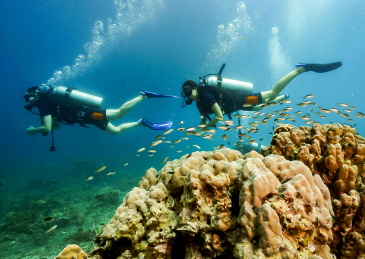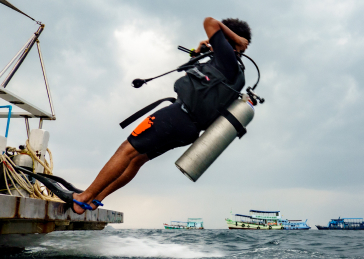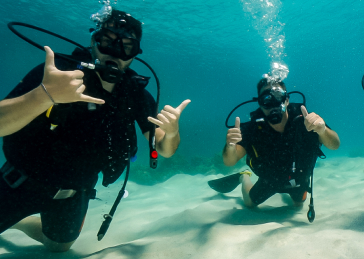Modified 12th June 2025
The Excitement of Liveaboard Work for Divemasters: Your Complete Career Guide
The excitement of liveaboard work for divemasters represents one of the most rewarding career paths in the diving industry. Unlike land-based dive operations, liveaboard work immerses you completely in the maritime lifestyle, offering unique opportunities to visit remote dive sites, work with international guests, and develop advanced professional skills. This comprehensive guide examines every aspect of liveaboard divemaster careers, from daily responsibilities to qualification requirements and career advancement opportunities.
For divemasters seeking adventure, professional development, and the chance to work in some of the world’s most spectacular diving locations, liveaboard work provides an unmatched combination of career growth and lifestyle benefits that make it an increasingly popular choice among diving professionals.
Why Liveaboard Work Appeals to Professional Divemasters
The excitement of liveaboard work for divemasters stems from the unique combination of professional responsibilities and adventure that this career path offers. Unlike traditional dive center work, liveaboard positions provide access to remote dive sites, extended time underwater, and the opportunity to work with diverse international clientele in an intimate setting.
Work at world-class locations like the Maldives, Red Sea, and Great Barrier Reef that day boats cannot reach. Experience advanced diving conditions that enhance your professional skills and underwater expertise.
Build relationships with guests from around the world and fellow crew members, creating a global network that can benefit your diving career for years to come.
Combine diving expertise with hospitality, safety management, and customer service skills. Many divemasters find this experience invaluable when advancing their diving careers.
Earn competitive salaries with accommodation, meals, and transportation included, allowing you to save significantly while working in exotic locations.
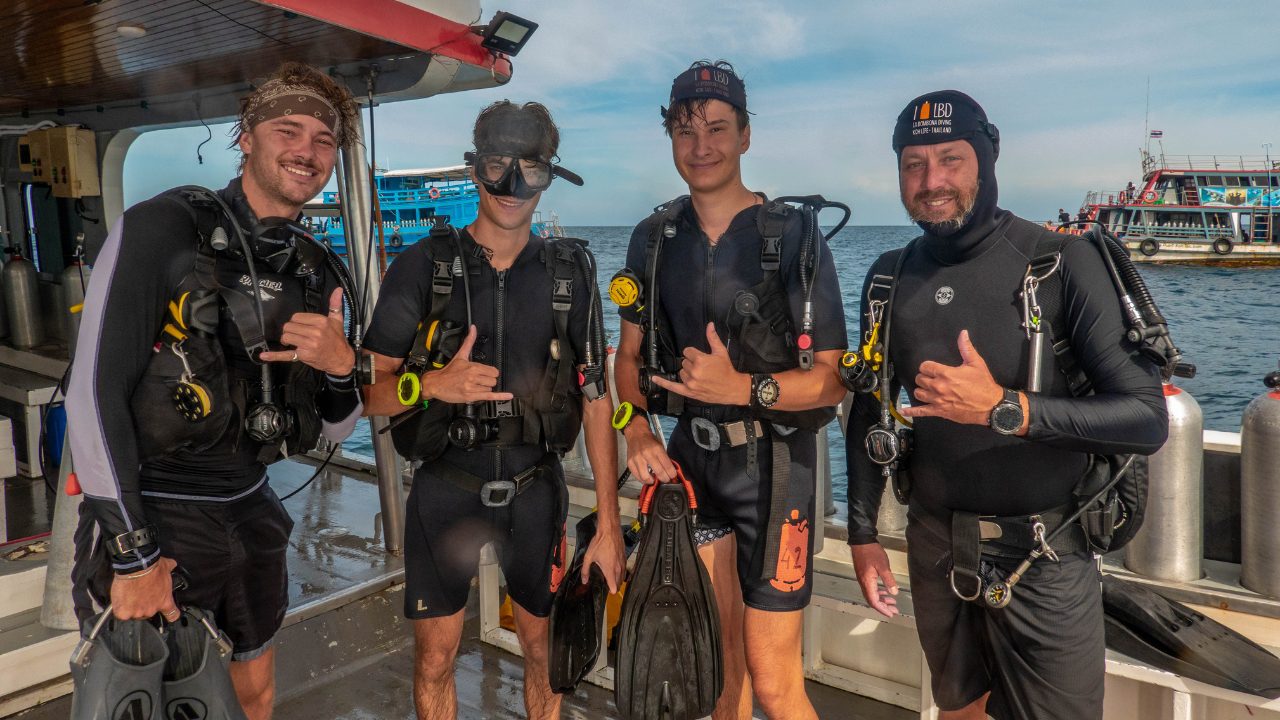
Daily Life and Responsibilities on a Liveaboard
Understanding the excitement of liveaboard work for divemasters requires examining the daily routine that defines this unique career. Liveaboard divemasters balance diving operations, guest services, safety management, and equipment maintenance in a dynamic maritime environment.
Typical Daily Schedule for Liveaboard Divemasters
Key Responsibilities and Skills Required
The excitement of liveaboard work for divemasters comes with significant professional responsibilities that require a diverse skill set. Successful liveaboard divemasters must excel in multiple areas beyond basic diving instruction.
- Dive Leadership: Guide groups of varying experience levels through challenging dive sites while maintaining safety standards
- Guest Relations: Provide exceptional customer service in close quarters, managing diverse personalities and expectations
- Safety Management: Conduct thorough safety briefings, equipment checks, and emergency procedures
- Equipment Maintenance: Perform daily equipment inspections, basic repairs, and inventory management
- Marine Life Education: Share knowledge about local ecosystems and conservation efforts
- Hospitality Services: Assist with meal service, cabin maintenance, and general guest comfort
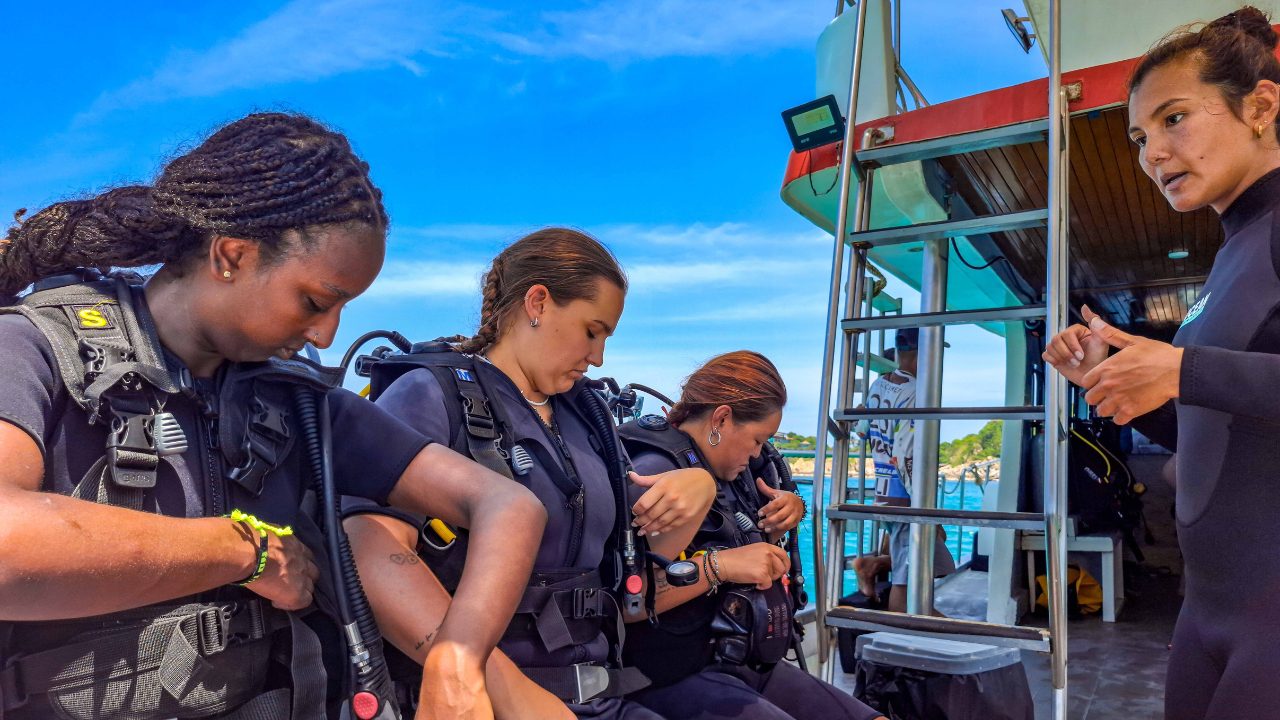
Essential Qualifications for Liveaboard Divemaster Positions
The excitement of liveaboard work for divemasters begins with obtaining the proper qualifications and certifications. Liveaboard operators maintain high standards for staff qualifications due to the remote nature of operations and the premium service expectations of guests.
| Qualification Type | Requirement Level | Details | Why It’s Important |
|---|---|---|---|
| Divemaster Certification | Essential | PADI, SSI, or RAID Divemaster certification | Legal requirement for guiding certified divers |
| Emergency First Response | Essential | Current CPR and First Aid certification | Remote locations require immediate medical response capability |
| Specialty Certifications | Highly Preferred | Deep, Night, Navigation, Wreck diving | Liveaboards access diverse dive sites requiring specialized skills |
| Nitrox Certification | Preferred | Enriched Air certification | Extended bottom times for multiple daily dives |
| Language Skills | Advantageous | Multilingual capabilities | International clientele requires diverse communication skills |
| Hospitality Experience | Advantageous | Customer service background | Liveaboards provide premium hospitality experiences |
Most liveaboard operators require divemasters to have substantial experience before applying. Consider gaining experience through comprehensive divemaster training programs that provide real-world experience in diverse conditions. The transition from land-based to liveaboard work represents a significant step up in responsibility and skill requirements.
Career Advancement and Professional Development
The excitement of liveaboard work for divemasters extends beyond immediate employment to long-term career development opportunities. Liveaboard experience provides valuable skills and networking opportunities that open doors throughout the diving industry.
Natural Career Progression Paths
Many divemasters use liveaboard experience as a stepping stone to instructor certification, gaining the practical experience needed for effective teaching.
Experienced liveaboard divemasters often advance to cruise director roles, managing entire guest experiences and leading dive operations.
The comprehensive skills developed on liveaboards translate perfectly to managing land-based dive operations and training centers.
Develop expertise in underwater photography, marine biology, or technical diving to offer specialized services to premium clients.
Liveaboard experience provides excellent preparation for careers in marine research, conservation, and environmental protection.
Many successful dive business owners started their careers as liveaboard divemasters, learning all aspects of dive operations and customer service.
Challenges and Considerations
While the excitement of liveaboard work for divemasters offers numerous benefits, success requires understanding and preparing for the unique challenges of maritime life. Prospective liveaboard divemasters should carefully consider these factors before committing to this career path.
Living and Working Considerations
- Limited Personal Space: Cabin accommodations are typically small and shared, requiring adaptation to close quarters living
- Intense Schedule: Long work hours with minimal time off during multi-day trips
- Weather Dependency: Operations can be disrupted by weather conditions, requiring flexibility and patience
- Social Dynamics: Managing relationships with both crew and guests in confined spaces requires strong interpersonal skills
- Physical Demands: Multiple daily dives and equipment handling can be physically demanding
- Remote Locations: Limited access to medical facilities, internet, and personal amenities
Understanding these challenges helps divemasters prepare mentally and physically for liveaboard work. Many find that the excitement of liveaboard work for divemasters more than compensates for these challenges, especially when they have proper preparation and realistic expectations.
Getting Started: Breaking Into Liveaboard Work
The excitement of liveaboard work for divemasters begins with strategic career planning and skill development. Breaking into this competitive field requires more than basic qualifications—it demands demonstrable experience, professional networking, and a comprehensive understanding of maritime dive operations.
Strategic Steps for Entry
- Gain Substantial Experience: Work as a divemaster at busy dive centers to develop customer service and safety management skills
- Develop Specializations: Pursue additional certifications in areas like technical diving, marine biology, or underwater photography
- Network Within the Industry: Attend dive shows, join professional organizations, and connect with current liveaboard staff
- Consider Location Flexibility: Be willing to work in various destinations to gain experience and build your reputation
- Maintain Excellent References: Build strong professional relationships that can provide recommendations for liveaboard positions
- Understand Cultural Diversity: Develop skills for working with international guests and crew from diverse backgrounds
Many successful liveaboard divemasters start their careers in diving destinations like Koh Tao, where they can gain intensive experience in a supportive environment. Programs designed for diverse backgrounds and experience levels provide excellent preparation for liveaboard careers.
Ready to begin your path to the excitement of liveaboard work for divemasters? La Bombona Diving’s comprehensive Divemaster program provides the intensive training and real-world experience you need to succeed in liveaboard careers.
- 60-day intensive Divemaster training program
- Unlimited ocean diving experience
- Small class sizes for personalized attention
- International certification recognition
- Career guidance and industry connections
- Advanced specialty training options
- Professional development workshops
- Job placement assistance for graduates
Divemaster Program: ฿40,000 – Everything included for your professional development
Launch Your Divemaster Career60-day program | Unlimited diving | RAID certification
Frequently Asked Questions About Liveaboard Divemaster Work
Dive with LBD: Your Gateway to Underwater Exploration
Whether you’re a curious beginner or a seasoned pro, our school is your portal to the wonders of scuba diving. Join us into the world beneath the waves.
READY TO GET STARTED?
Check our diving courses in Koh Tao
